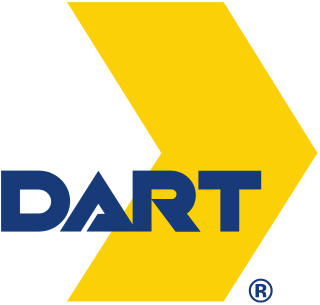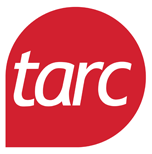
Dallas Area Rapid Transit (DART) is a transit agency serving the Dallas–Fort Worth metroplex of Texas. It operates buses, light rail, commuter rail, and high-occupancy vehicle lanes in Dallas and twelve of its suburbs. In 2023, the system had a ridership of 50,463,300, or about 167,100 per weekday as of the third quarter of 2024.
The Metropolitan Transit Authority of Harris County (METRO) is a major public transportation agency based in Houston, Texas, United States. It operates bus, light rail, bus rapid transit, HOV and HOT lanes, and paratransit service in the city as well as most of Harris County. It also operates bus service to two cities in Fort Bend County, and to Conroe in Montgomery County. The Metro headquarters are in the Lee P. Brown Administration Building in Downtown Houston. In 2023, the system had a ridership of 77,189,800, or about 244,700 per weekday as of the third quarter of 2024.

The Los Angeles County Metropolitan Transportation Authority (LACMTA), branded as Metro, is the county agency that plans, operates, and coordinates funding for most of the public transportation system in Los Angeles County, California, the most populated county in the United States.

The Ann Arbor Area Transportation Authority (AAATA), branded as TheRide, is the public transit system serving the Ann Arbor and Ypsilanti area in the U.S. state of Michigan. In fiscal year 2021, the system had a ridership of 1,725,797.

The Transit Authority of River City (TARC) is the major public transportation provider for Louisville, Kentucky and parts of southern Indiana, including the suburbs of Clark County and Floyd County. TARC is publicly funded and absorbed private mass-transit companies in Louisville, the largest of which was the Louisville Transit Company. In 2023, the system had a ridership of 6,655,200.

The Rapid is the public transit operator serving Grand Rapids, Michigan and its surrounding suburbs. The Rapid operates local service in urban areas in Kent County, and regional service to Ferris State University and Grand Valley State University in Mecosta and Ottawa Counties.

The Detroit Department of Transportation (DDOT) is the primary public transportation operator serving Detroit, Michigan. In existence since 1922, DDOT is a division of the city government, headed by a director appointed by the mayor. Primarily serving Detroit and its enclaves, DDOT is supplemented by suburban service from the Suburban Mobility Authority for Regional Transportation (SMART). In 2023, the system had a ridership of 11,048,700, or about 43,500 per weekday as of the third quarter of 2024.

The Capital Area Transportation Authority (CATA) is the public transit operator serving the Lansing, Michigan area, including service on the campus of Michigan State University. In 2023, the system had a ridership of 8,082,200.
The Capital Metropolitan Transportation Authority, officially stylized as CapMetro, is a public transportation provider located in Austin, Texas. It operates bus, paratransit services and a hybrid rail system known as CapMetro Rail in Austin and several suburbs in Travis and Williamson counties. In 2023, the system had a ridership of 25,229,400, or about 83,300 per weekday as of the third quarter of 2024.

The Lehigh and Northampton Transportation Authority (LANTA) is a regional public transportation authority that provides public bus and rapid transit service throughout the Lehigh Valley region of eastern Pennsylvania, including Allentown, Bethlehem, Easton, and their respective suburbs.

The Kansas City Area Transportation Authority (KCATA) is a public transit agency in metropolitan Kansas City. It operates the Metro Area Express (MAX) bus rapid transit service in Kansas City, Missouri, and 78 local bus routes in seven counties of Missouri and Kansas. In 2023, the system had a ridership of 12,006,600, about 41,500 per weekday as of the third quarter of 2024.
The Southwest Ohio Regional Transit Authority (SORTA) is the public transport agency serving Cincinnati and its Ohio suburbs. SORTA operates Metro fixed-route buses, bus rapid transit, microtransit, and paratransit services. SORTA's headquarters are located at the Huntington Building in Cincinnati’s Central Business District. The agency is managed by CEO and General Manager Darryl Haley along with a 13-member board of trustees. In 2023, the system had a ridership of 13,091,500, or about 44,600 per weekday as of the third quarter of 2024.

Birmingham-Jefferson County Transit Authority (BJCTA) is the public transportation operator in the city of Birmingham, Alabama and surrounding areas. Created in 1972 to take over transit operations from private operators, it operates 109 buses on 38 routes. It also operates paratransit services, as well as micro transit services. In 2023, the system had 1,792,000 rides, or about 7,300 per weekday as of the third quarter of 2024.

The Suburban Mobility Authority for Regional Transportation (SMART) is the public transit operator serving the suburbs of Detroit, Michigan, United States. Beginning operations in 1967 as the Southeastern Michigan Transportation Authority (SEMTA), the agency was reorganized and renamed SMART in 1989. SMART operates 45 bus routes, plus paratransit and microtransit services.

The Denton County Transportation Authority (DCTA) is the transit authority that operates in Denton County, Texas. It operates transit service in three cities within Denton County, as well as the A-train, a regional commuter rail line to Carrollton. In 2023, the system had a ridership of 2,852,000, or about 8,900 per weekday as of the third quarter of 2024.

The Portage Area Regional Transportation Authority, commonly referred to as PARTA, is a transit agency serving Portage County, Ohio. It is headquartered in Franklin Township just outside the Kent city limits. PARTA was formed in 1975 from an agreement between the city of Kent and Franklin Township and has since expanded to include routes over much of Portage County. It operates several local routes including circulator and suburban routes in Kent, and an interurban route connecting Ravenna, Kent, and Stow. PARTA also offers express routes including services into downtown Cleveland, Akron as well as weekday service to the rural Portage County communities of Windham, Garrettsville and Hiram. In addition, PARTA includes Kent State University's Campus Bus Service, which it acquired in 2004, and a dial-a-ride service. In 2023, the system had a ridership of 903,300.

The South Bend Public Transportation Corporation is a municipal bus system that serves the cities of South Bend and Mishawaka, as well as the nearby suburbs of Notre Dame and Roseland, in the very north of the U.S. state of Indiana. It is the most recent incarnation of the South Bend Railway Company, a street railway company that was founded on May 25, 1885. Transpo receives funding from local, state and federal taxes. In 2023, the system had a ridership of 1,262,400, or about 5,000 per weekday as of the third quarter of 2024.

Mountain Metropolitan Transit (MMT) is the primary public transportation operator for the Colorado Springs metropolitan area. It provides bus service between Colorado Springs, Manitou Springs, and Security-Widefield. There are currently thirty-four local routes. In 2023, the system had a ridership of 2,991,300, or about 12,100 per weekday as of the third quarter of 2024.

Battle Creek Transit is the primary provider of mass transportation in Calhoun County, Michigan, United States. Eight Routes provide service from Monday through Saturday. In 2007, all buses were equipped with bike racks. Nearly 500 designated stops are available within the system. Current service times area 5:15 am – 6:45 pm Monday-Friday, 9:15 am – 5:15 pm Saturday. No service on Sunday or major holidays. In 2023, the system had a ridership of 209,300, or about 1,700 per weekday as of the third quarter of 2024.
Twin Cities Area Transportation Authority (TCATA) is an urban/rural transit provider that provides fixed-route and dial-a-ride bus transit service throughout the Benton Harbor, Michigan-Saint Joseph, Michigan area. It was established in 1974. It is funded through federal grants and state and local funds. and run by the elected Board of Trustees with consultation from the Local Advisory Council made up of residents within the service area.

















